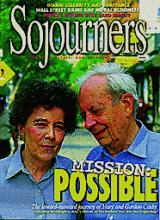Is it just me, or are we being sold an increasingly militarized presidency in recent movies?
I first noticed the trend with last year's Independence Day, in which the president of the United States saves the world from alien invaders by flying his own nuclear-armed fighter jet in a coordinated air attack on huge, nasty flying saucers. He is a veteran of the Persian Gulf war, which is enough to give him hero status in the movie.
While the script never raises any disturbing questions about that war, the president repeatedly frets about the decision to use nuclear weapons, showing that he is the quintessential Reluctant Warrior. His concern wins our sympathyand prepares us to accept whatever action he takes as necessary.
This year the heroic American president is none other than Harrison Ford in Air Force One. Again, the president's heroism is measured by his combat experience; again, his (temporary) anguish over the use of force when confronted by a terrorist threatening his family and staff earns our sympathy.
This time, however, global political realities are allowed brief cameo appearances. The president solemnly declares a new policy of intractable opposition to terrorismnew, we are to suppose, in that he actually means it. (True to genre and to real life, no one even cracks a smile, let alone raises questions about U.S. support for terrorists in Central America, Angola, or Israeli-occupied Lebanon.)
The character who at last points out that the United States killed 100,000 Iraqi civilians in the Gulf war is the terrorist villain. His dastardly question is so out of bounds morally that no one in the movie, least of all the president, bothers to reply.
Read the Full Article
